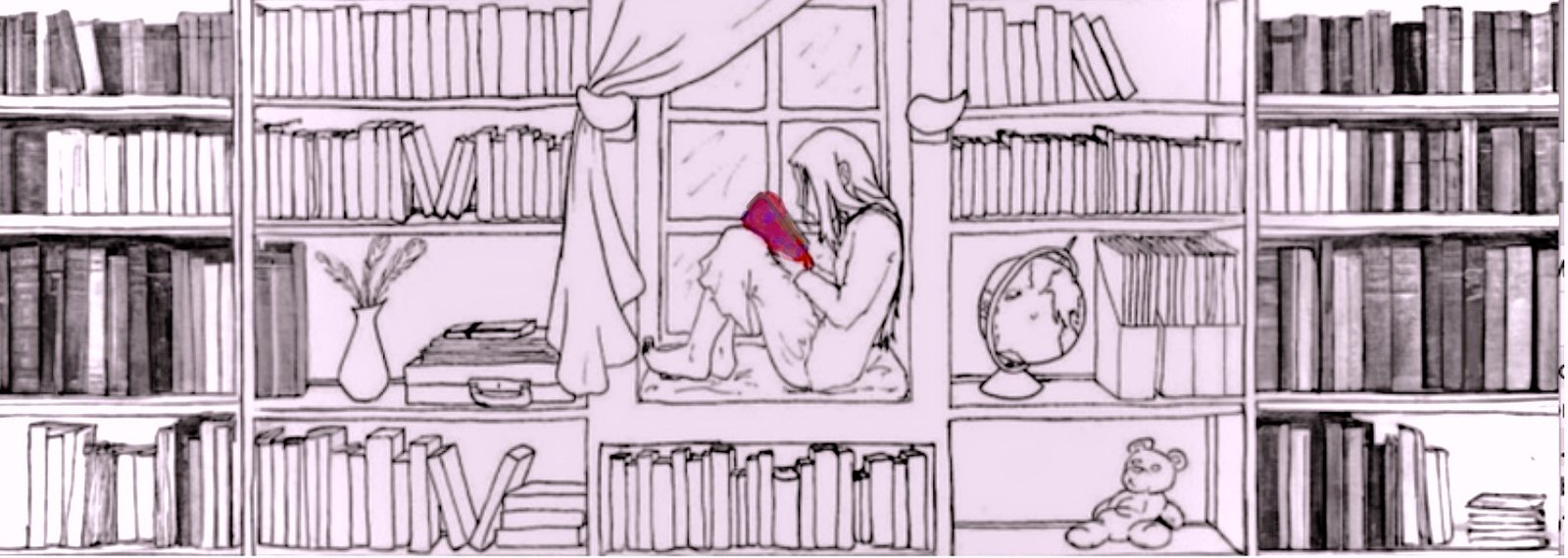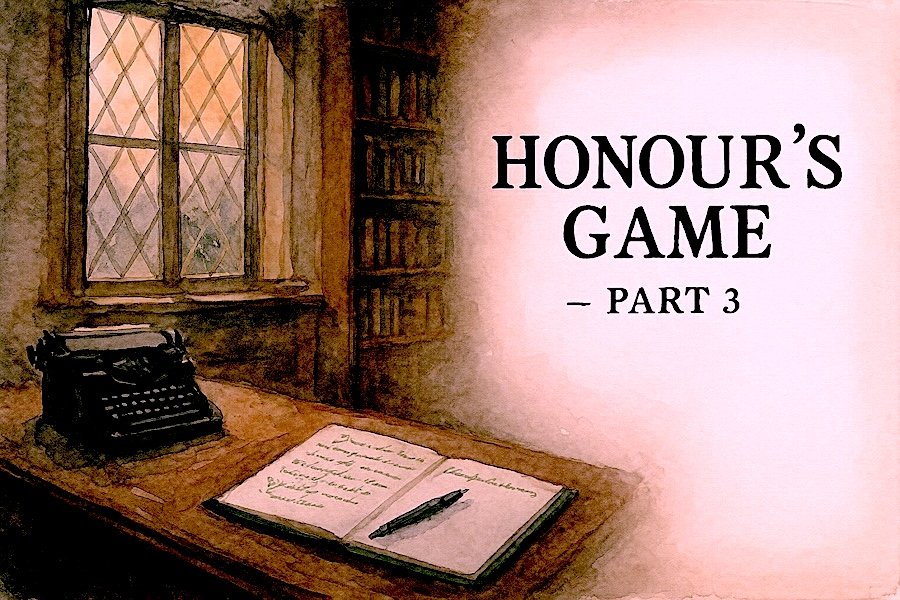2 comment(s) so far. Please add yours!
The story of Inez de Vries’s experiences in the summer of 1955 unfolds through a series of documents – some official, pulled from the prim and unforgiving files of Saint Clare’s School for Girls; others are more intimate, drawn from the journals, letters, and scribbled notes of the girls themselves. Some will appear typed and orderly; others will retain the texture of handwriting, rendered in a cursive-style font. Readers are invited to step into the role of archivist, assembling the story from these traces, and imagining the lives that fill the gaps between pages—the tensions, the alliances, the secrets too dangerous to write down. Not everything will be explained.
But Inez watches. And remembers.
This story takes readers back to 1938 and tells the story of Inez’s parents, especially Lady Gwendolyn “Honour” de Vries, a St. Clare Old Girl who notices far more than most people realize.
Note: Comments are read and much appreciated. Much as I like reading them on Twitter and Bluesky, I love getting them here and promise to respond. Moreover your responses and ideas are included in the archives and may shift and change the story’s evolution. Also, the observant reader may notice Honour has a new font. I hope it’s more readable.
Having trouble with the handwriting? Try the plain text version.
Greystone Abbey, January 1939

If you’ve followed Honour this far – through her first lesson, her first report, and her first taste of consequence – you’ll know how easily a game of observation can become something else.
The new year finds her far from Belgravia, shut in by rain and flooded fields, testing both her wit and her husband’s patience. The guests have gone; Darlington’s lessons continue.
This story follows:
You might want to read them first.
Part Three
From the Archivist
From the Lady de Vries Collection, Blue Room Archives, Saint Clare’s School for Girls
The papers presented here form part of what is now known as the Lady de Vries Collection. Though the correspondence was originally preserved among the private files of her husband, Edmund Alexander de Vries, 9th Earl of Darlington, its preservation and eventual deposit at Saint Clare’s are due to Lady Gwendolyn Randolph de Vries herself.
The exchange of initials — D. and H. — occurs throughout. Their precise origins are unclear; however, internal evidence suggests that these letters were both a private correspondence between husband and wife and, increasingly, a record of informal “exercises” undertaken by Lady de Vries during the late 1930s.
The editors have retained the original orthography and punctuation. A few later pencil notes in Lord Darlington’s hand are reproduced in grey type. Where the line between affection and assignment blurs, readers are invited to remember that the world beyond these pages was also shifting — toward war, secrecy, and a very different kind of education.
Recovered documents: December 1938 – January 1939
The following entries belong to that first winter at Greystone Abbey, when the young Countess was learning that discipline can be an intimacy of its own. The surviving pages are marked in her hand and his — neat pencil corrections threading through her typed reports. Both of them writing in their fountain penned script. What began in London drawing rooms now turns domestic, quieter and more perilous.
In these documents, the young Lady Honour de Vries continues working to master her husband’s “exercises”—tasks meant to discipline her curiosity and temper her impulsiveness. Yet what began as a private game of observation now reaches beyond the drawing room. A tea in Chester Square leads to the American Embassy at Grosvenor Square, and the world of polite conversation begins to tremble with rumours of the coming war.
Through reports, annotations, and private diaries, we see the gradual shaping of a partnership: his precision against her wit, his restraint against her appetite for understanding. Honour still writes to please him—but she is also beginning to see, to listen, and to turn the rules of his game to her own advantage.
The tone remains domestic, almost playful. Yet under its surface, something colder and more intricate begins to form.
Note: Comments are read and much appreciated. Much as I enjoy seeing them on Twitter and Bluesky, I especially love receiving them here and promise to respond. Your observations and ideas are entered into the Saint Clare archives and may subtly shift the story’s evolution.
Honour’s Game – Part 3 – December 1938 – January 1939
January 1939 brought unending rain as though the sky itself saw what the future held and wept.
At Greystone Abbey in the remote English Northeast, the lawns lay under a film of water, the gravel paths turned to pale rivers. Near the house the air smelled perpetually of damp wood and coal smoke. Within, the fires hissed rather than blazed, and the Earl’s study filled with the slow fug of tobacco and steam.
Most of the remaining holiday guests departed mid-morning, 7th January, following the Abbey’s Twelfth Night celebrations. The last of the stragglers left after lunch, leaving in their wake muddy footprints, half-empty decanters, and the faint scent of perfume lingering in the stairwells. By evening, the house had fallen still again. The servants said their lord disliked the London season; his lady bit her tongue but thought instead that Darlington disliked anything he could not control.
Honour’s Private Journal
 7 January 1939
7 January 1939
(Not for anyone. Especially not him — though I suspect he already knows.)
They are finally gone. My first Christmas at Greystone Abbey is done. It is such a relief to be alone, to know we won’t be dining again in that vast, draughty hall. Instead, I’ve asked the fire be lit in the small breakfast room. It will be good to be snug again.
I must confess it: sometimes, in my boredom, I try to provoke him. A sharper laugh, a glance held too long, a whisper too near another man’s ear. Nothing dreadful, nothing truly damning — but enough that I wonder: will he notice? And he always does. Always.
Last night, as I was brushing my hair, he came up behind me, took the brush from my hand, and said it plain:
“You test me, Honour. You prod to see if I am watching. I believe you want me to rise, to remind you I am still stronger than your mischief.”
I couldn’t deny it. He is too clever, too seasoned, to be deceived. He has lived through wars before this one, while I am only beginning mine. I felt myself blush and whispered, ashamed, “Yes. I only want to feel you notice — seeing me.”
Ned smiled then, his eyes grave but not unkind. He lifted my chin so I could not look away.
“I notice, Honour. I always notice. And if it is a thrill you want, I can give it without your endangering us both. But you must not play games in other men’s company to win it. That I won’t tolerate.”
I promised to stop. Truly, I did. It was almost a relief to have him say aloud what I hardly dared write here — to know he will provide, as he provides everything, even the little shocks and excitements I crave.
I do not think he underestimates me any longer. He knows I am young, foolish, sometimes bored. But he also knows I am his. And that, I think, is the version of myself I want him to see. The version I want to be.
Tonight he took my brush again, continuing the strokes without pause. I could feel him counting them. Ned always counts his strokes — never aloud, but never fewer than a hundred. The rhythm steadied me: tug and fall, tug and fall, until I almost forgot my shame.
When he had finished two hundred strokes, he leaned close, his voice low, his hand at the back of my neck, gently holding me in place. Our eyes met in the mirror. He took up last night’s conversation as though a day hadn’t passed.
“You want to be seen, my Honour? Very well. You will be seen. You will write your next exercise as though you were careless — as though you dropped every secret into the room as if your pearls broke and fell upon the carpet. And then you will bring it to me. I shall show you exactly what such carelessness earns.”
I shivered. He was not threatening, not cruel. It was play, and I knew it. But my heart beat fast all the same, for in that instant I understood: he would set the game, he would hold the rules, and I need never go seeking elsewhere for the thrill of being caught.
He brushed my hair another dozen strokes — slow, deliberate — then set the brush down carefully, his eyes in the mirror never leaving mine. His hand lingered at the nape of my neck, warm, commanding.
“I notice, Honour,” he said again. “I always notice. And I will give you more than mischief ever could.”
I bent my head, willingly this time. Whatever the task, however stern the lesson, it is better when he is the one to set it.
Scene Setting
Morning of 8 January 1939
On waking Honour found Ned’s note on her vanity tucked under her hairbrush, his handwriting exact as ever:
Exercise I – “The Broken Necklace”
You will return to Lady Fenton’s tea. Same day, same guests, same sunshine, same bad biscuits.
However, this time, imagine you allowed your pearls to scatter across the carpet. Let what should private spill as though by accident. Write it at once, before you remember how to guard yourself.
Exercise I – “The Broken Necklace Version”
(Submitted by Lady de Vries, 8 January 1939)
To: D.
From: H.
Occasion: Tea at Lady Fenton’s, Belgravia. Sunshine like spilt sherry on the parquet, biscuits as dull as her talk. I let them refill my sherry glass three times, let my stewed cup of tea chill in its cup.
I confess I spoke more than listened. When Lady Fenton asked whether I missed London, I told her truthfully that the countryside keeps its own amusements — walking, shooting, even spying. She laughed and said I had grown quite the country wife and asked what I spied. I replied, “The wildlife in the hedgerows — one never knows what one might find.” Then I smiled and said I was never much suited to sitting quietly. She pretended to take this as flirtation; perhaps it was.
Lord Fenton told again the tale of his Bolshevik sister. I asked, lightly, whether perhaps the doctor was not so dreadful a match, since he must at least know how to mend things when they break. He did not laugh, though the others did. In the silence that followed I asked if he had heard anything more from Unity. He glared at me, then, unsmilingly, abruptly left the room — the chuckles of those who’d overheard following in his wake.
Mrs P. leaned too close, her sherry breath like syrup, and whispered that she had written again to “our friends” for the new Mercedes parts. I said the German cars were elegant, though one pays a moral tariff these days. She blinked as though I had spoken Greek.
The attaché with the fine moustache bowed when he left and said he hoped next time I might come alone, so he could show me his latest wager. I smiled sweetly and said I found wagers dull. He fetched me another sherry and asked what I preferred for excitement. I thanked him, letting my hand brush his wrist, and replied, “I like to play with men who hold all the cards.” I meant you, of course, though I daresay he thought otherwise.
Lady Fenton called after him that young wives are wasted in the country. I told her that some gardens bear better fruit when left to ripen unseen. I believe she thought I was boasting.
Postscript
My Darlington, perhaps I was.
As we drove home through the fog, I wondered whether you would mark me harshly for speaking so much, or gently for speaking at all. Even more I wished to know why this is so dangerous
Yours,
Honour
Ned’s Margin Notes (in pencil, 8 January 1939)
– “Three glasses.” Careless. Even as pretence, excess weakens your edge. Control first; charm second.
– “The countryside keeps its own amusements.” Too forward, yet the phrasing is deft. The laughter will cover it, but remember: the clever remark is remembered longest.
– “Unity.” Dangerous curiosity. You cannot afford to be the one who mentions the names others avoid. They will not forgive it, even if they laugh. They will not forget.
– “Mercedes parts.” You heard what half the room missed. Good. But do not announce your understanding before you know who else heard.
– “The attaché.” Here your imagination betrays you. The line was perfect — too perfect. He will repeat it to someone, and they will wonder how you learned to play so knowingly. Wit is safest when it seems unstudied.
– “Gardens bear better fruit when left to ripen unseen.” Well turned, but again: you overestimate the intelligence of your audience. When you speak in metaphor, they hear invitation.
– Closing lines: restraint regained. You know the danger even as you dance with it.
That, my sweet Honour, is what makes this exercise worth doing — and what makes it perilous. We shall continue this lesson tomorrow, drawing on the excesses in your behaviour over the past two weeks. I wonder if you can remember them all?
Honour’s Private Journal
8 January 1939
(Not for anyone. Especially not him — though I suspect he already knows.)
He has marked it. I found the paper on my desk after dinner, folded once, my own handwriting facing upward, his pencilled notes threading through like veins.
I read them all, every line. The corrections sting and amuse in equal measure — “Control first; charm second.” “Too perfect.” “They will wonder how you learned to play so knowingly.” I can almost hear him saying it, that steady, unhurried voice that makes even reproof sound like affection.
But it was his last line that took my breath — not the words themselves, but what they promise.
“That, my Honour, is what makes this exercise worth doing — and what makes it perilous. We shall continue this lesson tomorrow, drawing on the excesses in your behaviour over the past two weeks. I wonder if you can remember them all?”
I read it three times, then again by lamplight, until the pencil began to blur. The excesses of the past two weeks. Does he mean the laughter at dinner? The teasing remark to the Major at the hunt? Or something smaller — the way I slipped my hand from his arm when we came in from the rain, just to see if he’d reclaim it?
He will remember them all, of course. He always does.
I ought to be nervous, but I find instead a queer, delicious restlessness. I cannot decide whether I want the “lesson” to be stern or kind. Perhaps both. I know only that he has already begun it — the waiting is part of the instruction.
He says my imagination betrays me. If he knew how much of this I imagine before it happens, I wonder what he would do then.
For now, I shall keep the page beside my bed. His pencil looks faint in the candlelight, but I can trace each word with my finger. We shall continue this lesson tomorrow. I can scarcely sleep for wondering what the lesson will be.
Morning of 9 January 1939
Breakfast Room, Greystone Abbey
Rain again, steady and unrelenting, blurring the park beyond the tall windows. The house smelt of toast and damp wool; the dogs scratched to be let out. Honour sat already at the table, gloved hands folded, pretending to study the marmalade jar as he entered.
He greeted her lightly, almost courteously.
“Good morning, my Honour.”
He took his seat, unfolded The Times, newly arrived by train, read a paragraph, and buttered his toast with the same slow precision she’d come to dread and admire.
Only when she poured his coffee did he speak, still without looking up.
Ned: You will write this morning. A report – like your others.
Honour: On what, my lord?
Ned: On yourself. These past two weeks should supply ample material. Title it The Abbey in the Storm. Type it neatly in the library. No crossings-out, no indulgence. Bring it to me in the study before luncheon.
She hesitated. “And the purpose?”
He turned a page.
“My dear, you should not think too much. Recall. Observe. Record. And remember that I have been here throughout – seeing you, and noticing.
He folded the paper, set it aside, and rose.
“By noon, Honour. Accuracy first, elegance after.”
And then he was gone, leaving her with the smell of his tobacco, the soft hiss of rain, and the cold glint of the library typewriter waiting down the hall. Glancing at the lovely new watch, a Christmas gift from Ned, on her small wrist, Honour considered how quickly the three hours until lunch might pass today


I’m so glad to see another installment of this delightful tale!
Thank you! Watch this space!